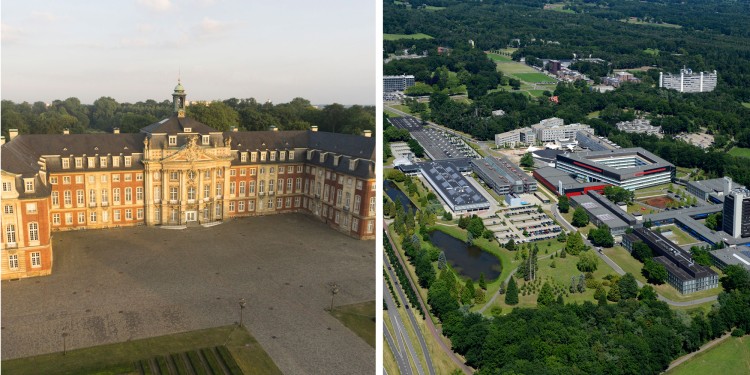
Cross-border collaboration in research and teaching
Academic and scientific exchanges across borders: the Universities of Münster and Twente have been collaborating for 40 years now. This strategic partnership with the Netherlands covers research collaborations, support for junior researchers and joint courses of study. “Münster is a university with 15 faculties offering the full range of subjects, and Twente has five faculties – and we complement each other very well,” says Dr. Mareike Blömker, the coordinator for the strategic partnership with Twente. And, as Prof. Johannes Wessels, Rector of the University of Münster, adds, “The broad-based basic research carried out in Münster joins up with technical applications research in Twente.”
With the aim of continuously expanding the partnership, the managements of the two universities recently initiated a further funding line in the so-called Collaboration Grants. So far, start-up funding is available for research projects. The idea behind such projects is that on the one hand they should advance collaboration between the two universities, and on the other have the potential to acquire third-party funding. The 80,000 euros in funding can be used, for example, to get projects started which help to set up new consortia or facilitate exchanges with industrial partners and companies. Funding lasts for twelve months. A new aspect is support for junior researchers’ projects. The first opportunity to apply for this funding line runs until the end of March. The focus is on bilateral research projects which are realised by PhD students. Experienced researchers can receive up to 50,000 euros for up to four years for supervising junior researchers. “In doing this,” says Prof. Monika Stoll, Vice-Rector for Research at Münster University, “we not only want to provide support for junior researchers – we also want to secure collaboration for the long term.”
An agreement signed in autumn 2022 covering doctoral degrees for the Faculty of Physics and the Faculty of Chemistry and Pharmacy aims to simplify these PhD courses. There is a greater focus on scientific collaboration as a result of the dismantling of administrative hurdles and the introduction of overarching regulations. The Collaborative Research Centre “Intelligent Matter: From responsive to adaptive nanosystems” at Münster initiated the agreement on PhDs. Under the agreement, researchers at the Universities of Münster and Twente supervise a large number of doctoral students.
Other topics of current importance are battery research and support for scientific spin-offs. Battery research and energy storage play a key role in dealing with global challenges in connection with the energy and mobility turnaround. In future, the Universities of Münster, Twente and Stanford (USA) will be working together in this field, and one of their tasks will be to train highly qualified battery researchers. The MEET Battery Research Centre at Münster University, headed by its scientific director Prof. Martin Winter, will be profiting from this trilateral expertise which covers a large part of the value chain for batteries.
Providing support for people wishing to get a start-up going in the border region between Germany and the Netherlands is a further component in the cooperation between the two universities. Since being set up in 2019, the REACH EUREGIO Start-up Center at Münster University has overseen more than 200 plans for start-ups which have so far led to 55 actually kicking off. The cooperation partners are the University of Twente’s Novel-T start-up centre, Münster University of Applied Sciences and the Digital Hub münsterLAND. The aim is to transfer scientific ideas to company practice through structured programmes.
The distance between the Universities of Münster and Twente is around 70 kilometres, about an hour’s drive by car. This is one of the reasons why collaboration works so well for undergraduates, PhD students and researchers in their everyday studies and work. Personal contacts at all levels are the basis for these 40 years of cooperation. “The international view and the intercultural collaboration are what make exchanges with Twente so exciting,” says Mareike Blömker, who has been coordinating the partnership with Twente since September 2020.
